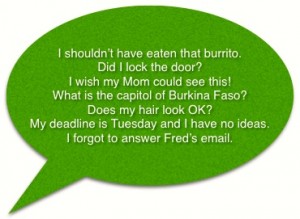Letting Distraction Go
 There are times when all of us are easily distracted by bright and shiny objects—diamonds, texts, emails, the slip of a finger, the person sitting in the front row, your next blog post… Have you ever woken up in the middle of a practice session and found that suddenly you have no idea how the last few phrases have gone? As in the waiter who “brings ‘it’ to your table covered in flaming brandy,” we definitely try to avoid that whenever possible.
There are times when all of us are easily distracted by bright and shiny objects—diamonds, texts, emails, the slip of a finger, the person sitting in the front row, your next blog post… Have you ever woken up in the middle of a practice session and found that suddenly you have no idea how the last few phrases have gone? As in the waiter who “brings ‘it’ to your table covered in flaming brandy,” we definitely try to avoid that whenever possible.
Dr. Noa Kageyama, of Bulletproof Musician, recently addressed our very human thought intrusions in his article, How to Get Those Distracting Thoughts Out of Your Head When You’re Trying to Practice.
…our brain has limited cognitive resources, and we can’t be fully engaged and productive if we have kitty litter and baristas on the brain. It’s like setting your snooze interval to 1 minute. Makes it impossible to get any meaningful snooze satisfaction, and is so annoying that you end up waking up and getting out of bed on account of the aggravation.
Of course, the human brain does this for very important reasons. Anyone who has ever woken up at 3 am knowing that Ouagadougou is the capitol of Burkina Faso, a fact which you couldn’t remember for your life at lunch, has experienced the benefits of interruption—of letting something incubate. We are hard-wired for random thoughts.
In his article, Kageyama linked to How to Have a Eureka Moment in which David Burkus discussed a study by Sophie Ellwood and her team of researchers. They found that subjects were more creative when tasks were interrupted and then returned to than when they worked continuously. They also found that purposely interrupting a task with an unrelated task generated the most ideas. The practice strategies in my recent post, Interference: No Penalty 2, are examples of using interruption to your advantage.
So, in some situations intrusions are healthy and good. Other times, not so much. Random thoughts popping into your brain during practice undermine your focus and progress. If you allow this to go on during practice then it will also happen in performance. (Notice I didn’t say might. I said will.)
Kageyama advocates using implementation intentions—making specific plans as to how you will complete tasks that are hanging over your head. This is actually something most musicians do daily. Such tasks might include emails, your kid’s science fair project, housetraining the puppy, fitting into your swimsuit next summer, or your next blog post. Here’s an example from another Bulletproof Musician blog post on formatting intentions:
…very specific sort of moment-to-moment action plan, containing the exact wheres, whens, and hows of your goal. Something like, “If lunchtime rolls around and I haven’t practiced the Rococo Variations yet, I’ll go to the practice rooms and start with them right after lunch.” Or, “If I go to Trader Joe’s for groceries, I will get bananas for desert instead of donuts.” Note the if-then format, as in “If I encounter situation X, then I will perform the goal-directed response Y”.
For me personally, one of the best strategies for dealing with random, distracting thoughts is simply to be present. When I find myself interrupted by outside thoughts, I gently bring myself back to the task at hand. I read this phrase somewhere years ago, possibly in Ann Lamott’s Bird by Bird (though I’m on the road now though and can’t check). The idea is not to scold or mentally berate yourself (thus prolonging the thought and making it more important than it really is), but to be aware of your thoughts, allow yourself to be human, and return yourself to focus should you suddenly find an urgent need to remember the capitol of Burkina Faso.
The thing that I love about this is that you can practice it throughout your day, not just when you are practicing. So, it reaps benefits in all aspects of your life. The other thing I love is that when you are performing and suddenly begin to think about what someone in the audience is thinking, or a slip of the finger, or your next blog post, it becomes automatic to just let it go and gently return to focus without breaking either a sweat or your musical intention.


